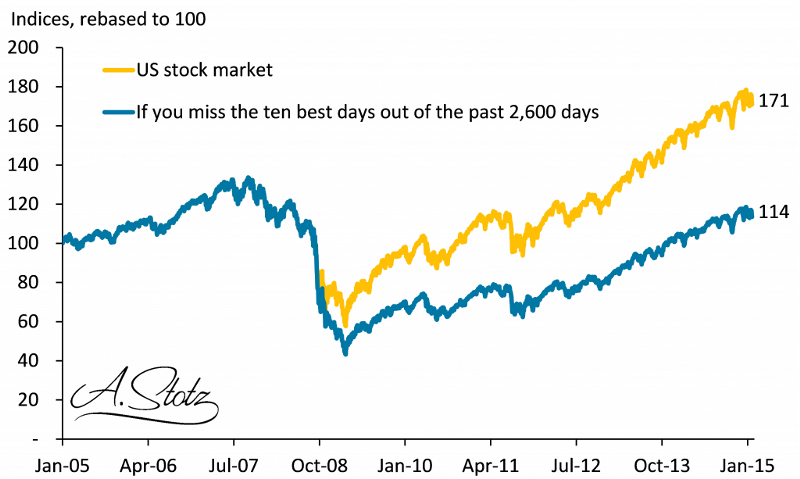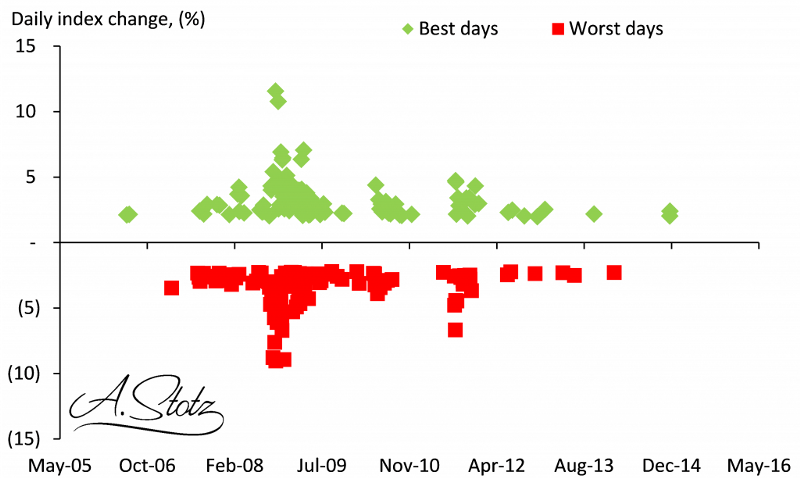Trading is Still Hazardous to Your Wealth
So you think you are an above-average investor? I bet that if we would ask that question to all investors around the globe we would come up with a similar answer as Svenson (1981) came up with when he asked Americans and Swedes whether they were above-average drivers. His findings were that more than 90% of Americans and about 70% of Swedes thought of themselves to be more skillful drivers than the average. The impossibility of these perceptions demonstrates the existence of overconfidence bias among humans.
But hey, you are professional, right? And investing skills don’t have anything to do with whether you are a good driver or not? That might be absolutely true, but to my knowledge there are no studies that have shown that experts in any field are not prone to overconfidence. Actually many have shown the opposite (send me a comment below if you want more evidence!). There are many implications for why overconfidence is a bad trait when it comes to investments. There are also many explanations for why and when professional investors as well as the average Joe and Jane exhibit overconfidence. This article will focus on one of the most predominant areas of overconfidence — trading.
Barber and Odean (2000) stated in the title of their classic paper that “Trading is hazardous to your wealth”, and it still is. The authors found that the average investor holds under diversified portfolios and that the most active traders underperform the market substantially. In addition, high trading volumes tends to increase price volatility and overconfidence is at least a partial explanation to over- and under reaction to market events. In their follow up paper “Boys will be boys” they also found evidence for the average Joe being more overconfident than the average Jane.
So should you become a boring buy-and-hold investor? The research shows that for most investors a buy-and-hold strategy is preferred over attempting to time the market. In fact, buy-and-hold might be a good strategy for you if you care about your terminal wealth rather than the action and excitement of trading.
Let’s take a look at the US stock market. The chart below displays how much less your terminal wealth would grow to by missing the ten best days in the past ten years. Those ten best days are randomly selected from the 100 best days for the whole time period. You start with $100 and instead of $171 at the end, you only get $114, which means missing the ten best days lost you 81% of the total gain!
Another interesting finding is revealed in the chart below. The best days tend to cluster around the worst days.
Hence, it’s highly possible that panic selling when the market plunges causes you to sell, which then takes you out of the market during its best days. As shown above, missing out on those best days can hurt your terminal substantially.
Be confident, but don’t become overconfident. By admitting that you suffer from overconfidence you are already ahead of most other investors. Overconfidence leads to poor decisions, and it also can lead to extensive trading. Besides the fact that fees related to trading will eat into your wealth, you will also run the risk of missing out on the best days if you are not in the market when they occur. It’s easy and human to become emotional and sell in panic when the market drops, but since most of the best days in the market come after the worst days you run the risk of being out of the market at just the wrong time.
So instead of trying to time the market, make sure that your portfolio is diversified. Your portfolio should be like a seaworthy boat that you can feel comfortable in even when a storm is kicking up on the ocean.
Any comments or questions you might have, I would love to know about it. Is anything unclear? Or would you just like to add anything to the post? Please let me know in a comment below.
If you found this article interesting, please share and forward it to your friends. (Pro tip: If you highlight any text you can share that exact quote with your friends)
DISCLAIMER: This content is for information purposes only. It is not intended to be investment advice. Readers should not consider statements made by the author(s) as formal recommendations and should consult their financial advisor before making any investment decisions. While the information provided is believed to be accurate, it may include errors or inaccuracies. The author(s) cannot be held liable for any actions taken as a result of reading this article.


